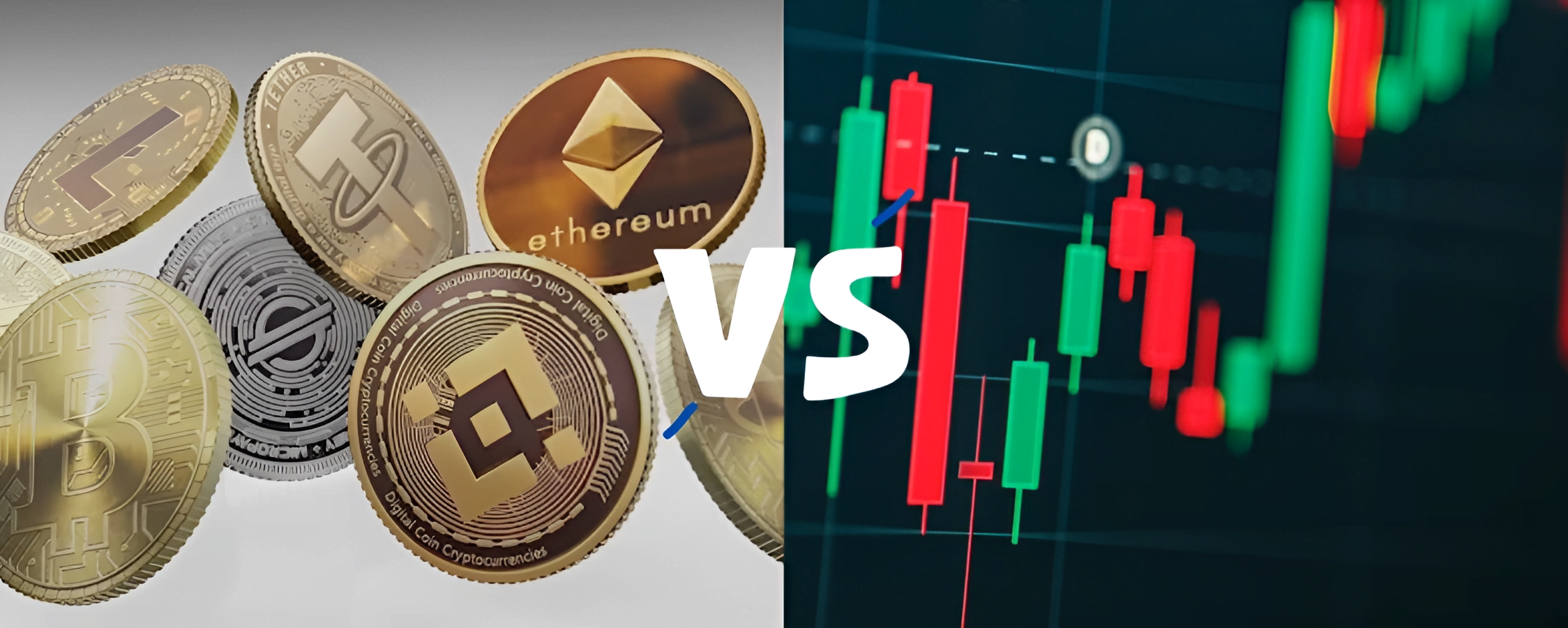Forex vs Crypto: Which Has Greater Profit Potential?

Trading in financial markets offers opportunities to potentially grow wealth over time. Both forex (foreign exchange) and cryptocurrency spaces have attracted many new participants in recent years seeking to profit from price fluctuations. However, the structures and behaviors of these two asset classes differ substantially. This leads to variances in the types of strategies used as well as overall profit outlooks. Let's take a deeper look at forex vs crypto and how forex trading stacks up against crypto investing when it comes to generating returns.
What is Forex Trading?
The forex market involves trading one nation's currency for another. It is decentralized without a central exchange, comprising billions bought and sold each day between banks, companies, investors, and traders. Major currency pairs like EUR/USD, USD/JPY, and GBP/USD make up the bulk of volumes.
Forex is a zero-sum game where one party's profit requires another's loss. It functions as a 24/7 global over-the-counter marketplace. Traders speculate on whether exchange rates will rise or fall based on economic indicators like interest rates, GDP, inflation reports, and geopolitical events. Some hold positions for seconds or minutes while others take longer-term views.
Leverage is available on forex, commonly ranging from 50:1 to 400:1 depending on the broker. This magnifies both gains and losses with small price movements having outsized financial impact. Brokers also offer different account types involving variable spreads and commissions on trades. Overall volumes indicate high liquidity in the most traded majors.
What is Crypto Trading?
Cryptocurrency operates outside the traditional banking system using blockchain distributed ledger technology. Instead of being issued by governments or backed by commodities, digital coins have market values attached purely due to supply and demand among traders.
Bitcoin was the initial crypto in 2009 but now over 10,000 alternative coins exist according to different blockchains, algorithms, and intended applications. Trading occurs across centralized exchanges as well as peer-to-peer over decentralized platforms. Volumes are substantial but still dwarf those in forex.
Unlike forex which uses national currencies as assets, cryptos lack intrinsic value tied to their currencies alone. Price formation thus depends almost entirely on speculation. Holding periods also tend to be shorter than many forex traders who focus more on economic fundamentals and technical analysis.
Leverage is riskier in crypto due to higher volatility and fewer circuit breakers on exchanges. However, lack of fiat currency exposure means no exchange rate risk versus other nations' currencies. Transaction costs range from minimal to high depending on payment methods used.
Forex vs Crypto Strategies

Given forex's size and history as a regulated market, strategies there rely more heavily on technical and fundamental analysis techniques. Traders study economic reports, monitor political events, and apply tools like moving averages, trend lines, and indicators to entry and exit criteria for currency pairs. Positions may span minutes to months.
In contrast, crypto lacks the same bedrock of economic data and central bank influence over exchange rates. Technical factors still play a role but strategies often follow momentum trades, social media hype around particular projects, and attempts at early investment into coins before parabolic price spikes. Hold times average weeks or months at most.
Fundamental analysis has less predictive value in crypto due to the greater influence of media, regulations, and retail sentiment over prices in isolation from traditional valuation methods. Technical patterns become self-fulfilling prophecies to a higher degree than forex as well.
What is The Profit Potential From Forex?
Average returns statistics indicate the forex market's balanced risk-reward over different accounts and time horizons. According to the NFA, around 73% of retail forex traders lose money, suggesting difficulty and emotional challenges. However, some advantages for potential profit include:
- High liquidity means smaller spreads and the ability to exit positions quickly without moving prices against the trader.
- Economic news often produces sharp spike reactions across major currency pairs that may be exploited by reaction traders.
- Leverage, while increasing risk, lets profits accumulate off small movements when used prudently with stops in place.
- Technical patterns tend to recur periodically based on familiar levels like Fibonacci retracements.
- Fundamental factors impart long-term directional biases traders can follow. For example, carry trades when high-interest currencies strengthen.
Drawbacks curbing consistent profitability include unpredictable geopolitical events, the need for disciplined risk/money management, and the tendency of retail traders to over-leverage and chase quick returns without education. Overall many see winning forex strategies requiring patience, experience, and willingness to accept small, frequent wins over huge payouts. Over time, consistent traders can realize returns averaging a few percent monthly.
What is The Profit Potential From Crypto?
Due to crypto's very recent history and lack of an underlying tether to independent monetary policy, predicting future profit odds proves daunting. Some key factors to consider:
- Historical volatility vastly exceeds forex and other assets, opening larger swings in both directions that may reward or hurt traders caught off guard.
- Lack of stable fundamentals or regulation means price discovery occurs radically via social media hype, exchange listings, and momentum shifts.
- Momentum trades attempting to catch large short-term gains dominate strategies versus position trading on fundamentals.
- New crypto projects emerge constantly, crowding the space and diffusing buying power across a widening array of alternatives over time.
- Bear markets have been violent when bubbles pop, erasing over 80%+ of value from peaks to lows.
- Lack of institutional adoption means more retail participation prone to panic at major pullbacks.
On the other hand, crypto's potential for massive percentage returns in short periods captivates many looking for wealth transformation rapidly. ICOs and early investments also create opportunities for life-changing gains resembling venture capital. Overall, the need for impeccable timing and risk controls seems even higher in crypto due to volatile new dynamics that defy traditional analysis methods. Several studies indicate the vast majority of crypto investors lose money, similar to forex statistics.
How Can You Get Consistent Profit?

While both trading markets carry substantial risks, discerning the macro conditions likely to fuel continued profits offers a perspective for traders establishing an edge. Some distinct factors when comparing forex vs crypto include:
Forex Advantages
- Most global liquidity, offering tighter spreads and more opportunities each day.
- Central bank policy transparency provides hints at medium-term trends.
- Lower volatility creates more stable environments for position trading.
- Leverage amplifies gains from fundamental analysis-based strategies.
Crypto Advantages
- Potential for outsized percentage returns over short periods attracts risk-takers.
- Media coverage introduces new coins to explode higher amid hype cycles.
- Fewer regulations provide swifter access to markets around the world.
- Momentum trades chasing viral projects can yield life-changing wins.
Ultimately, the key to profit in any market centers on controlling risks sensibly and developing a unique approach suited to an individual's temperament, schedule, and risk tolerance. In forex, proven technical analysis and position style trading off fundamentals may impart an experience-based edge over time for disciplined operators.
Crypto tends to reward those able to anticipate social contagions and deploy knowledge of industry trends amid wild swings, yet also hurts many amid bubbles. Both present challenges—forex demands patience, and crypto more precise timing ability. Overall, neither offers a sure path to wealth without managing the inherent dangers intelligently.
Conclusion | Forex vs Crypto
Both forex and cryptocurrency markets deliver the potential for high rewards. Yet they differ fundamentally in their underlying drivers of exchange rates and price behavior. The volatility, lack of regulation, and influence of media in crypto trading create a riskier landscape best navigated by those comfortable with rapid wins and losses.
Alternatively, forex may suit investors with temperaments for withstanding drawdowns by maintaining a long-term orientation to fundamentals, technicals, and consistent risk protocols. Both require ongoing study, but forex presents lower barriers to adopting knowledgeable, lower-risk strategies backed by analyses of global economic trends.